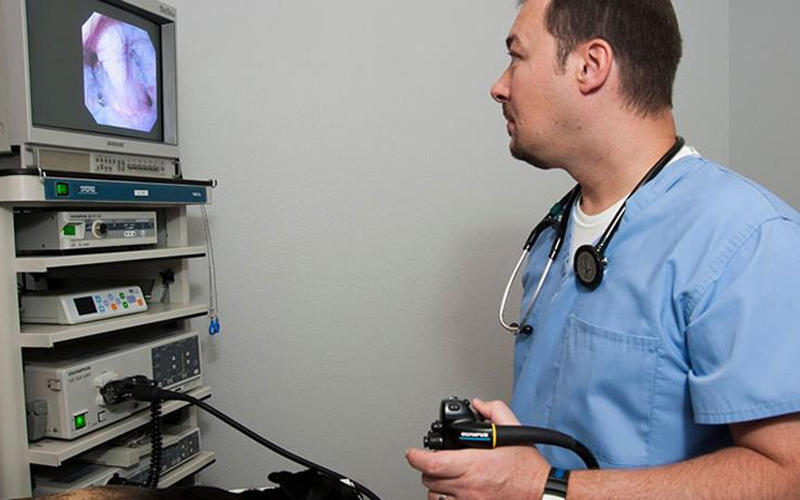Inflammatory Bowel Disease (IBD) or Chronic Enteropathy (CE) in Dogs and Cats

What is Inflammatory Bowel Disease, or Chronic Enteropathy?
Inflammatory bowel disease (IBD), also known as chronic enteropathy (CE), is one of the most common causes of chronic vomiting and diarrhea in cats and dogs. While the exact cause remains unknown, factors involved include the:
- Pet’s genetics
- ‘Triggers’ within the intestinal tract (gut) like changes in the normal bacteria (called dysbiosis)
- Certain food types or ingredients
- Inappropriate immune reaction by the pet’s own body
This reaction by the intestinal tract (gut) causes inflammation and leads to worsening of clinical signs such as vomiting, diarrhea or poor appetite. Importantly, IBD is sometimes confused with irritable bowel syndrome (IBS); however these are two very different diseases and require different treatments. IBS is relatively uncommon in dogs and cats.
What are the signs that my pet has IBD or CE?
Signs of IBD/CE can include gastrointestinal (GI) signs and others such as:
- Vomiting
- Diarrhea
- Change in appetite (eating less, ‘picky’ appetite, rarely eating more)
- Change in the pet’s attitude or energy level (quiet, sleepy, dull)
- Weight loss
How is a diagnosis of IBD/ CE made?
Unlike other causes of GI signs in dogs and cats, IBD/ CE does not get better or resolve on its own. It lasts for more than 3 weeks (making it a chronic disease), and may not respond completely to medicines or a change in the pet’s diet.
Tests your veterinarian may use to diagnose IBD/CE include:
Blood and urine tests to determine how severely the pet is affected, to evaluate for concurrent disease, and to help plan treatment strategies
Testing of feces or a deworming trial to ensure parasites are not involved
Imaging like ultrasound and X-rays to look for other causes of disease and to assess the appearance of the stomach and intestines
Specialized blood tests to investigate for non-GI causes of your pet’s signs like pancreatitis and hormonal disease as well as measurement of B vitamins
Biopsy of the intestinal tract – either surgical or endoscopic biopsies are needed to confirm and characterize the disease, and its severity. Biopsies also help to confirm that there is no hidden cancer or infection present, and sometimes helps to direct therapy.
How is IBD/CE treated in pets?
Initial treatment usually includes a deworming medication and diet change (specific veterinary advised novel protein or hydrolyzed protein diet, and/or low fat diet) to assess for the possibility of adverse reaction to food as a reason for your pet’s clinical signs. If your pet does not respond to either of these treatments and/or biopsies confirm the diagnosis of IBD/ CE, medication to reduce the inflammation and the immune response might be required (e.g. prednisone/prednisolone, or other immunosuppressive drugs).
The goals of IBD/CE treatment are to:
- Improve quality of life for the pet and pet’s family by reducing the signs
- Decrease the inflammation in the intestinal tract
- Allow the pet’s normal intestinal bacteria to return to balance
What is the prognosis of IBD/CE in pets?
Inflammatory bowel disease/chronic enteropathy is rarely cured but can be well managed and controlled with dietary and/or medical therapy. In most pets, the prognosis with medical and dietary management is good, and there is no impact to their expected lifespan.
In some pets, side effects from immune suppressing medications can occur (such as increased drinking and urination). As uncomfortable as these side effects may be (for the pet and the household), it is important to realize that these effects are typically short-term. Side effects will improve as the medication’s dose is decreased, therapy changes, and as the pet improves.
A relapse or worsening of symptoms in pets with IBD is most commonly due to:
- In dogs with adverse reaction to food, a lack of strict diet management (giving treats or using different foods)
- Incorrect diagnosis (i.e. if biopsies are not obtained to confirm clinical suspicion)
- Tapering or stopping medications too quickly
Ask your veterinarian any questions you have about IBD/CE and its treatment. Your veterinary specialist will want to work with you and your primary veterinarian as a team since you are the ones who know and understand your pet the best.
Where can I learn more about IBD/CE?
The specialists among the American College of Veterinary Internal Medicine have developed a consensus statement about how to diagnose IBD/CE. A link to this scientific paper is available below.
Endoscopic, Biopsy, and Histopathologic Guidelines for the Evaluation of Gastrointestinal Inflammation in Companion Animals. The WSAVA International Gastrointestinal Standardization Group, R.J. Washabau, M.J. Day, M.D. Willard, E.J. Hall, A.E. Jergens, J. Mansell, T. Minami andT.W. Bilzer. J Vet Intern Med 2010; 24:10-26.
Edited by:
Joseph Cyrus, DVM, DACVIM (SAIM)
April, 2020
Articles by Specialty
- Cardiology (19)
- Large Animal Internal Medicine (23)
- Neurology (17)
- Oncology (21)
- Small Animal Internal Medicine (29)
Articles by Animal
- Cats (35)
- Dogs (52)
- Farm Animals (5)
- Horses (12)
